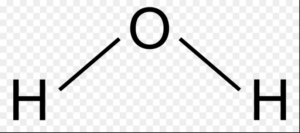Oracle IAS, the best coaching institute for UPSC/IAS/PCS preparation in Dehradun brings to you UKPCS Science Chemistry (paper 6).
What are the Main Properties of Water?
This article will discuss the five main properties of water:
- Its attraction to polar molecules
- High-specific heat
- High heat of vaporization
- The lower density of ice
- High polarity

- Water’s Attraction to Other Polar Molecules
Cohesion
Cohesion, otherwise known as water’s attraction to other water molecules, is one of the major properties of water. Water’s polarity lends it to be attracted to other water molecules. The hydrogen bonds in water hold other water molecules together. Due to water’s cohesiveness:
- Liquid water has surface tension. This allows for insects, such as Water Striders, to walk on water.
- Water is a liquid at moderate temperatures, and not a gas.
Adhesion
Water’s attraction between molecules of a different substance is called adhesion. Water is adhesive to any molecule it can form hydrogen bonds with. Due to water’s adhesiveness:
- Capillary action occurs. For example, when you have a narrow tube in water, the water will rise up the tube because of water’s adhesiveness to the glass “climbing” up the tube.
- Water’s High-Specific Heat
Water can moderate temperature because of the two properties: high-specific heat and the high heat of vaporization.
High-specific heat is the amount of energy that is absorbed or lost by one gram of a substance to change the temperature by 1 degree celsius. Water molecules form a lot of hydrogen bonds between one another. In turn, a lot of energy is needed to break down those bonds. Breaking the bonds allows individual water molecules to move freely about and have a higher temperature. In other words: if there are a lot of individual water molecules moving about, they’ll create more friction and more heat, which means a higher temperature.
The hydrogen bonds between water molecules absorb the heat when they break and release heat when they form, which minimizes temperature changes. Water helps maintain a moderate temperature of organisms and environments.
Water takes a long time to heat up, and holds its temperature longer when heat is not applied.
- Water’s High Heat of Evaporation
Water’s high heat of vaporization is the other property responsible for its ability to moderate temperature.
Water’s high heat of evaporation is basically the amount of heat energy needed to change a gram of liquid into gas. Water also needs a lot of energy in order to break down the hydrogen bonds. The evaporation of water off a surface causes a cooling effect. Much like among humans—when we get hot, or energy inside our body is breaking chemical bonds, we sweat as a cooling effect. In this case, the same process occurs: as the water evaporates off the the surface of the skin, it cools down the surface.
- The Lower Density of Ice
At cooler temperatures, the hydrogen bonds of water molecules form ice crystals. The hydrogen bonds are more stable and will maintain its crystal-like shape. Ice—the solid form of water—is less dense than water because of the hydrogen bonds being spaced out and being relatively apart. The low density is what allows icebergs to float and are the reason that only the top part of lakes are frozen.
- Water’s High Polarity
Water is a polar molecule that has a high level of polarity and attraction to ions and other polar molecules.
Water can form hydrogen bonds, which make it a powerful solvent. Water molecules are attracted to other molecules that contain a full charge, like an ion, a partial charge, or polar. Salt (NA+ CL-) dissolves in water. Water molecules surround the salt molecules and separate the NA+ from the CL- by forming hydration shells around those two individual ions.
Printed notes topic wise – Contact us
Cost- Rs.5000/- (including shipping)
(~2500+ pages)
UKPCS Mains Study Material subject wise
The notes are strictly as per UKPCS syllabus (topic wise):
Individual Polity Cost: Rs. 1500/- (including shipping)
Individual S&T Cost: Rs. 1500/- (including shipping)
Individual Geography Cost: Rs. 1500/- (including shipping)
Individual Economics Cost: Rs. 1000/- (including shipping)
Individual Ethics Cost: Rs. 1000/- (including shipping)
Individual History Cost: Rs. 1500/- (including shipping)
Contact us for:-
-
-
-
-
-
-
- Upper Mains UKPCS Classroom program
- UKPCS Upper Test Series
- UKPCS Lower Test Series
- UKPCS Lower Classes
- UKPCS Past year papers
- Phone Number:–9997453844
- Telegram channel : click here
-
-
-
-
-
- UKPCS Upper Mains 2024 Study Material : Prepared by Experts Topic wise - April 6, 2024
- UKPSC Mains 2024:New Syllabus Pattern - April 6, 2024
- Oracle IAS’s Mentorship Program for UKPCS 2024 Pre Exam - March 21, 2024
